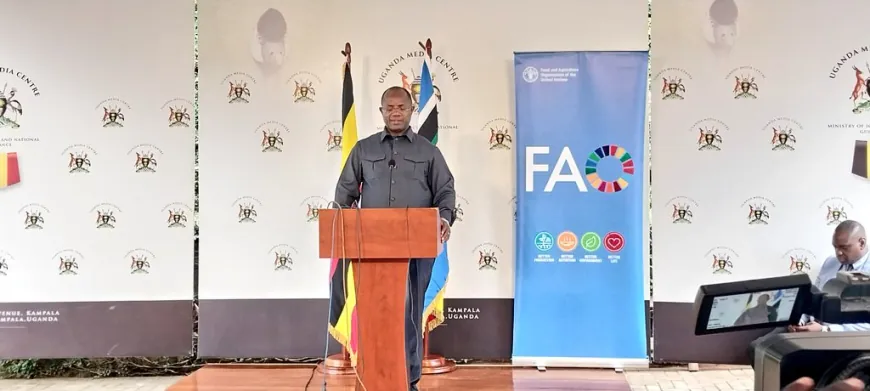MAAIF announces new Food & Agricultural Regulatory Authority to Promote Food Safety, address Fake Veterinary and Agrochemicals

With support from key stakeholders including development partners such as FAO, WFP, Parliament, and the public among others, The Ministry of Agriculture, Animal Industry and Fisheries (MAAIF) is in the advanced stages of establishing a new body called the Food & Agricultural Regulatory Authority (FARA) to handle the promotion of food safety, quality, and address issues on Veterinary and Agro Chemicals, a component that has previously been handled by National Drug Authority (NDA)
This according to Hon. Fred Bwino Kyakulaga, the Minister of State for MAAIF has followed rising concerns on fake veterinary and agrochemicals from farmers, dealers, and others coupled with the need to relieve NDA of the docket of Veterinary and Agro chemical issues with the addition of food safety and quality element.
The initiative also comes amid growing concerns over the prevalence of unsafe food on the market, with estimates indicating significant human and economic tolls.
“We have analyzed and found the right agency to handle veterinary and agrochemicals. it will be called the Food & Agricultural Regulatory Authority -FARA. We have high incidences of fake veterinary and agrochemicals because the agency that is handling the matter is technically fitter to handle another field, and also it is handling too many things. Besides that, we have added another element of food. Currently food quality and safety are almost like an orphan” he said

The Minister has also urged Ugandans to prepare a commemoration the 44th World Food Day which is observed every year on 16th October with a call to unite in achieving food security while encouraging farmers to embrace modern, sustainable agricultural practices.
“I call upon all Ugandans to unite in our mission to achieve food security for everyone. Farmers, I urge you to embrace modern, sustainable agricultural practices. The private sector is encouraged to continue investing in value addition and agro-processing. And our development partners, civil society, and the general public—let us work together to promote nutrition-sensitive agriculture and food safety systems” he said.
The national event will be hosted at the National Agricultural Research Organisation (NARO’s) National Semi-Arid Resources Research Institute (NaSARRI) in Serere District, with a theme: “Right to Foods for a Better Life and a Better Future.”
Among the primary objectives of FARA according to MAAIF is to establish a uniform safety and quality standards across various sectors, including plant-based food, fisheries, and animal products, while rigorously regulating the use of agrochemicals, veterinary drugs and inputs to ensure adherence to stringent safety guidelines.
In an interview with Dr Antonio Querido, the Country Representative of the Food and Agricultural Organization of the United Nations (FAO), who is in support of the new regulatory authority, he said that “Ensuring that the food produced in the country is safe and trustworthy for both local and international markets is critical for Uganda’s economic development. As FAO, we believe that having a regulatory authority to oversee and enforce safety and quality standards is the right way to go. Such an authority would help build trust among consumers and other markets, thus boosting the country's economy”.
NaSARRI profile:
NaSARRI beholds a rich history spanning 102 years of pioneering agricultural research in Uganda playing an invaluable role in reviving orphaned crops like millet and sorghum, which are critical for food security, particularly in the semi-arid regions of our country. Sorghum, in particular, has been identified as beneficial for diabetic patients, as it helps reduce blood sugar levels.
These crops according to MAAIF are also rich in vital nutrients, ensuring that we not only have enough to eat but also eat well to live healthier lives.
NaSARRI’s work exemplifies the connection between agricultural research and the right to food, as they develop resilient crop varieties that meet the nutritional needs of our population while ensuring food security for future generations.












